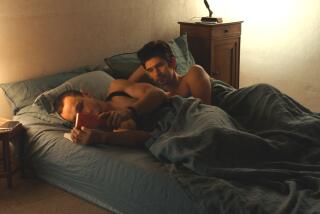‘Blue Valentine’ wins an ‘R’ rating on appeal
- Share via
After several weeks of noisy protest by Harvey Weinstein, the Motion Picture Assn. of America on Wednesday eased up on its rating for his studio’s film “Blue Valentine,” changing the Ryan Gosling- Michelle Williams romantic drama from NC-17 to an R.
The Weinstein Co., which refused to cut an oral sex-scene that apparently triggered the NC-17 rating, won on appeal. Instead of bearing an NC-17 rating for “a scene of explicit sexual content,” the film has been given an R for “strong graphic sexual content, language and a beating.”
The rating paves the way for the film, which opens Dec. 31, to be released in a wide array of theaters and to be marketed in a broad range of media outlets; an NC-17 would have restricted those options because some cinemas refuse to show films with the rating.
“I think the message the MPAA is sending here is that it’s a new era, and they’re going to listen to someone if they sit in front of them, and they’re going to do what’s right,” said Weinstein Co.’s chief operating officer, David Glasser. The MPAA has come under increasing fire for ratings decisions that critics say take a hard line on sex and language but allow copious amounts of violence.
Wednesday’s decision, which saw Harvey Weinstein and attorney Alan Friedman present their case in front of a 14-member MPAA board in Los Angeles, marks the third time out of six appeals in 2010 that a rating has been overturned, but it is the first time this year that an NC-17 has been changed to an R. It marks a victory for Weinstein and avoids a potentially thorny situation in which he either would have been forced to back down and cut the scene or release the film as an NC-17 picture.
Historically, the MPAA and its Classification and Rating Administration prevail in appeals, forcing studios either to alter their movies or accept more severe ratings than they’d like. The Weinstein Co. had said it was prepared to release the film as an NC-17 picture had it not won the appeal, rather than cut the movie or release it as an “unrated” film.
The Weinstein Co. said the MPAA awarded the NC-17 initially because of a scene in which Gosling’s character performs oral sex on Williams’ character. The studio and director Derek Cianfrance had argued for several weeks that the scene was integral to show the development of the couple’s relationship and that, without any nudity, it was not exploitative or gratuitous.
Weinstein had issued numerous press releases about the matter in recent weeks and held a special screening Saturday inviting members of the Hollywood community to see the film and weigh in via an online petition. Last week, Cianfrance told The Times that the appeal was a “chance to stand for something,” citing what he believed was a “form of censorship” on the MPAA’s part.
He also said he couldn’t see any way the scene could be altered without undermining the point of his movie. “Cutting the scene would have been cutting into the heart of the film,” he said.
Weinstein had gone in front of the board with what the company said was a 200-page dossier, which included letters from parents and psychologists and what the firm said was several thousand tweets in support of an R. He also held a test screening in Kansas City in which participants were asked to rate the film for themselves; about 80%, the company said, responded that it merited an R.
More to Read
The biggest entertainment stories
Get our big stories about Hollywood, film, television, music, arts, culture and more right in your inbox as soon as they publish.
You may occasionally receive promotional content from the Los Angeles Times.











